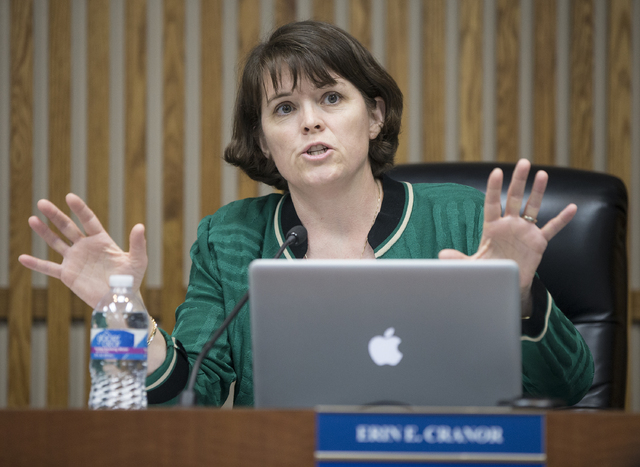CCSD seeks balance in setting social media, texting policy

As the Clark County School Board works to address a spate of sexual misconduct between staffers and students, its development of a policy on electronic communication is emerging as a complicated and controversial issue.
The danger that private communications between educators and students can facilitate inappropriate behavior is amply illustrated by the Clark County School District’s log of sexual misconduct cases. Of the 12 staff members arrested since July, seven had fostered their relationships with students through texting or social media, according to police records.
But most trustees interviewed in the wake of the Review-Journal’s Broken Trust series say the ability for teachers to communicate with students by text, social media or other electronic means also is important to the educational process.
The Clark County School District’s lack of a social media policy is one of the key findings highlighted in the three-part series on sexual misconduct involving staffers and students.
The district is developing a policy with the help of a 27-member internal working group. But at least five of the seven School Board members indicated this week that the benefits of electronic communication have to be weighed against the dangers.
Board President Deanna Wright, for instance, noted times when her son’s teacher or coach would text reminders to students about practice or getting a good night’s sleep before a test.
“I think those technology things can keep them connected to their teacher, and the teachers can encourage them, remind them, answer questions,” she said.
“It’s almost just like anything else in society,” Wright said. “When it’s taken out of the realm of normal, when people kind of go off the rails and do things that reasonable people wouldn’t do … that’s when it becomes, I think, inappropriate.”
Trustee Carolyn Edwards said the problem is the kind of interaction and how it’s done, whether it’s one-on-one or copied to all the students in a classroom.
“I don’t think you want to take away the ability to communicate with students,” she said. “I think communicating with students about schoolwork is a good thing. Communicating with students on a social level is never appropriate.”
Trustee Linda Young echoed that point, saying she remembers talking to her students over the weekend when she was a teacher.
“All the students called me on the phone,” she said. “They would call in the evening (when) they had a question.”
Trustees Lola Brooks and Erin Cranor agreed that there are legitimate reasons for students and teachers to have conversations outside the classroom and indicated that could include electronic communications.
“Apps that bring texting — an everyday part of life that many students enjoy — into classrooms can help mitigate some of the challenges that come with our very large class sizes and facilitate learning in ways that perhaps nothing else could,” Cranor said in an email.
But Brooks said some interactions would be inappropriate.
“I would say as far as being friends on Facebook, things like that, I’d say that’s something they should avoid,” she said.
A June 15 public roundtable on sexual misconduct will feature the recommendations of the working group, including a social media policy.
Contact Amelia Pak-Harvey at apak-harvey@reviewjournal.com or 702-383-4630. Follow @AmeliaPakHarvey on Twitter.